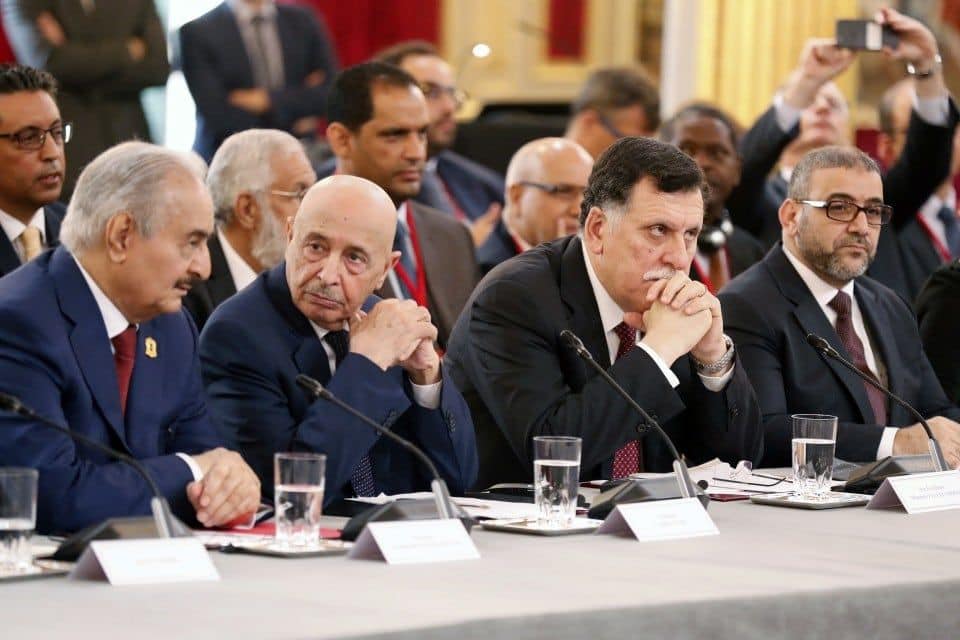Peace and Justice in Libya’s Transition
By https://rowaq.cihrs.org
Although nearly a decade has passed since the anti-Gaddafi uprising, Libya remains in a precarious transitional phase in which neither peace nor justice has emerged. Since the ouster of former Libyan leader Muammar Gaddafi in 2011, a series of rival governments and militias have vied – often violently – for political and economic control of the country. Criminal accountability rose to the forefront of the Libyan conflict in June 2011, when the International Criminal Court (ICC) issued arrest warrants for Gaddafi, his son Saif Al Islam Gaddafi, and former head of intelligence Abdallah El Senussi.[1]
Since then, additional ICC arrest warrants have been issued for army commanders Al-Tuhamy Mohammed Khaled and Mahmoud Al Werfalli.[2] 35 Gaddafi regime officials were domestically prosecuted in 2013 and 2014, directly challenging the ICC’s efforts to prosecute some of those same individuals. Moreover, an amnesty law passed by one of Libya’s governments is thought to have led to the release of Saif Al Islam Gaddafi in 2017.[3] Since these initial domestic prosecutions took place, justice processes have quickly waned, especially as the country grapples with localized as well as national struggles for power.
Regardless of the occasional surge in ICC activity regarding the Libyan situation, criminal justice considerations have largely been absent from the string of attempts at peace talks in recent years. Notably, the highly anticipated findings in the final report of the Libyan National Conference Process (NCP) devote substantial sections to the need for ‘reconciliation,’ while rarely mentioning the need for justice.[4] This is in contrast to the National Dialogue Conference (NDC) process in Yemen, which included a working group on transitional justice, although its recommendations were not implemented as the country descended into renewed war. While Libya faces very different challenges, the Yemeni context elicits important points of comparison that shed light on the inconsistent, if not destabilizing, impact of international actors as well as domestic blunders that weakened prospects for peace and justice.
For example, whereas the United Nations Security Council (UNSC) referred the Libyan situation to the ICC through Resolution 1970, it stopped short of doing so in the case of Yemen. Instead, the Gulf Cooperation Council (GCC), with the support of the UN, the US, and the EU, brokered a transitional agreement that allowed former Yemeni president Ali Abdallah Saleh to step down in return for his immunity from prosecution.[5] Moreover, attempts to pass a UNSC resolution to refer Syria to the ICC failed following a Russian and Chinese veto in 2014.[6]
While these three decisions produced contrasting outcomes in Libya, Yemen, and Syria, they were, arguably, all motivated by the same political consideration: whether the pursuit of peace or justice would better suit state interests. This is, of course, far from surprising. Scholarly work on the relationship between international criminal law and peace versus justice considerations is well established.[7] The politics of international law certainly helps explain why both domestic and international actors pursue competing accountability agendas. As the cases of Libya, Yemen and Syria demonstrate, neither peace nor justice prevailed in the aftermath of the mass anti-government uprisings of 2011. Decisions based on how and in what order peace or justice should be pursued have thus been unhelpful for these non-paradigmatic cases of transition.[8]
The peace versus justice debate is a well-trodden path in transitional justice literature.[9] Both domestic and international actors exploit the justice narrative as a political tool to serve power interests. This is, in part, exacerbated by the tendency to confine justice-related policies to a separate policy category. This article argues that Libya’s tumultuous transition requires a justice approach that informs all policy areas outlined in the NCP in order to strengthen prospects for a more sustainable peace.[10] In other words, rather than relegate justice and reconciliation to a separate policy area that runs in parallel to others, as is currently the case in the NCP report, justice and reconciliation should – and in many ways already implicitly do – figure into the four other policy areas: national and government priorities, security and defense, distribution of powers and resources, and constitutional and electoral processes.[11]
This article does not aim to present a detailed analysis of the justice processes that have unfolded in Libya since 2011. Rather, it seeks to highlight the complicating role of political fragmentation at the international and domestic levels on the issues of peace and justice, while offering suggestions for a justice approach that is less isolated and more integrated in Libya’s overall transitional process. This requires an expanded understanding of what constitutes ‘justice,’ so that it is not confined to prosecutorial forms that transitional states are often unprepared to handle effectively. When understood as multi-faceted, justice does not only serve reparative and restorative purposes, but it also serves to address socio-economic, political and security challenges.
This article takes the term ‘reconciliation’, which remains largely undefined in the NCP report, as a starting point to address these multifaceted issues. It begins by outlining international actors’ involvement in decisions regarding criminal justice in Libya. This is important in order to highlight the reasons why international actors’ do not necessarily pursue a monolithic objective of criminal accountability and the impact this has on the trajectories of peace and justice. This is followed by an analysis of the role of justice in the consultations that generated the NCP report, which lays the foundation for the actual National Conference that is expected to take place in 2019. The article concludes by engaging in a framework for peace and justice in Libya, placing emphasis on factors that should be taken into account when and as Libya embarks on the next critical step in the NCP and its broader transition.




Leave a Reply
Want to join the discussion?Feel free to contribute!